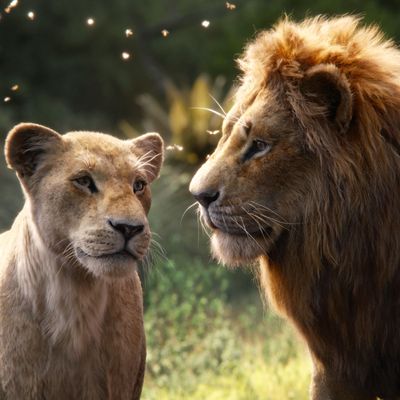
This review was originally published earlier this month. We are republishing the piece as the film hits theaters this weekend.
Technically speaking, it’s a marvel. Jon Favreau’s “live action” remake of Disney’s The Lion King possesses all the immersive detail and tactile immediacy of an unusually good nature documentary. It transports us. We can practically feel the fur on these animals, and we want to duck away from their thundering heels as the camera breathlessly rushes us through trembling grass and craggy ravines. It’s hard to imagine that this has all been created in a studio, and that almost none of it is real. It’d be a great case of “How did they do that?” except that they did it so well that you forget that they did anything at all. “Oh, the lion is singing? Well, how ’bout that? I didn’t know a lion could sing. But there it is — a real lion, singing.”
That’s the good news. The not-so-good news is that, having entered the photorealistic realm, The Lion King’s mood too has changed. Suddenly, that iconic opening scene, with all the animals gathering to bow before the newborn lion cub Simba, held up like some sort of scepter of absolute power, doesn’t feel triumphant or moving, as it did in its fantastical, animated setting. It feels queasily authoritarian. But of course, the filmmakers recognize that. So now, when the old king Mufasa (voiced again by James Earl Jones) shows the young Simba the extent of his domain (“Everything the light touches is our kingdom …”), we now appropriately get some additional dialogue about how it’s not really his: “It belongs to no one, but it will be yours to protect.”
But by and large, this new Lion King hews pretty closely to the animated Lion King, at times even replicating the same shots and editing patterns as the original. And the effect can feel like a stunt — like someone decided to do a scene-by-scene re-creation using real-life animal footage. It doesn’t help that the characters in some cases have been rendered with such realism that they have lost all human expression on their faces. Maybe that’s the idea — to not anthropomorphize them too much and to stay grounded in zoological authenticity. But they’re still talking, and singing, only now their faces are inexpressive; it’s a weird disconnect.
That creates an unfortunate hierarchy among the actors, allowing some to shine while leaving others to drift. As Scar, the conniving, embittered uncle who kills Mufasa and claims the throne for himself, Chiwetel Ejiofor brings the kind of howling, snarling energy you’d expect from a true Shakespearean; he connects to the story’s raging passions. (Of course, this was also true of the original, which had the sensuous, slithery stylings of Jeremy Irons.) Whenever he’s “onscreen,” the film has genuine power.
As the grown-up Simba, Donald Glover stays too above the fray. He’s ordinarily a fine actor, but here we sense a distance between his character and his voice. It reminded me of how Disney’s actual nature docs, the Disneynature series, will often have the narrator half-perform dialogue for the creatures onscreen, just to keep things interesting. As Nala, Beyoncé suffers a similar fate. The talking lion might look realistic, but when we hear her dialogue, all we see is Beyoncé in a recording booth, reading lines. The comic-relief characters split the difference: Seth Rogen and Billy Eichner are delightful as the farting warthog Pumbaa and his wiseass meerkat pal Timon; John Oliver is plunge-a-skewer-in-your-ears irritating as Mufasa’s avian steward Zazu.
Favreau’s previous talking-animal-heavy Disney live-action remake, The Jungle Book, was a masterpiece — a stylized, communitarian fever dream that transformed the thickets and caves of its wild landscape into a grand stage for its operatic fable of betrayal and belonging. Whenever The Lion King sticks with that approach, it works beautifully. Pride Rock, the outcropping on which much of the movie’s drama turns (and where the animal kingdom’s fate is decided) looms heavily in the characters’ minds. When Simba takes his final, lonely walk to accept his royal destiny — his supposed moment of triumph — we can sense his hesitation. Similarly, Scar’s nocturnal performance of “Be Prepared” (which, in the original, was a dementedly surreal vision of marching hyenas and roaring hellfire) makes for a mocking echo of that “Circle of Life” opening scene: Instead of making the entire savannah bow down before his heir in the morning light, Scar assembles his ghostly gathering of scavengers, as he leaps sneering and singing from rock to rock, raging, contemptuous, and prideful.
While numbers like “Be Prepared” and Pumbaa and Timon’s gaseous rendition of “Hakuna Matata” retain their charm, the songs too are uneven in this new Lion King. Glover and Beyoncé’s duet of “Can You Feel the Love Tonight” is, as a piece of audio, utterly glorious, and yet it has little impact onscreen (where, for some reason, it’s performed in total daylight), because neither Simba nor Nala has come through as an engaging character. The couple of new pieces that have been added also seem out of place, but that might be because the old songs are so familiar at this point. It all speaks to the uneven impact of this glossy, no-expense-spared version of The Lion King: It’s a stirring reminder of what can be achieved with all the talent (and money) in the world, as well as a cautionary tale of what can happen when there’s no vision to bind it all together.


